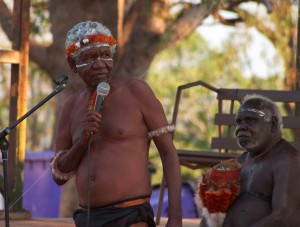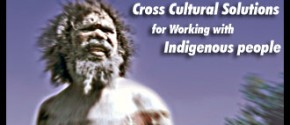
Yolŋuw Makarr Dhuni (Yolŋu Nations Assembly) Statement on Stronger Futures Legislation
Yolŋuw Makarr Dhuni represents the people of 8 nations in the Western, Central and East Arnhem Land areas of the Northern Territory:
Miwatj, Laynha, Raminy, Marthakal, Garriny, Gumurr-Rawarraŋ, Gaṯtjirrik and Miḏiyirrk
They have released this statement, regarding Australian Federal Government Stronger Futures Bills and Northern Territory Policies, to the Leaders of the Australian Federal and Northern Territory Parliaments: Prime Minister Julia Gillard, Opposition Leader Tony Abbott, Leader of the Australian Greens Christine Milne, Northern Territory Chief Minister Paul Henderson and Northern Territory Opposition Leader Terry Mills, with a copy to the Federal Minister for Family, Housing, Community Services and Indigenous Affairs Jenny Macklin.
To the Leaders of the Australian Federal and Northern Territory Parliaments:
1. The Yolŋu Nations reject the Stronger Futures Bill (and those associated) and call on the Senate to discard these Bills in full. We have clearly informed you that we do not support the legislation.
The Australian Federal Government can achieve all its aims through partnership in our communities. They have no need to grant themselves the continued and new powers contained within these Bills.
2. Until the Stronger Futures Bill (and those associated) are thrown out of the Australian Federal Parliament, the Yolŋu Nations call on all traditional owners across the Northern Territory to refuse:
a) participation in land lease negotiations with the Australian Federal Government, and
b) approval for any exploration licenses
3. The traditional owners (T.Os) of prescribed community lands have been placed under extreme pressure from the Australian Federal Government to grant them head leases over these communities. T.Os want independently facilitated negotiations that can result in enhancing the interests of both the T.Os and the Australian Federal Government.
4. The Land Councils are increasingly being pressured by Government to act outside their roles and become agencies of Government. We want our Land Councils to advocate for our needs and not have their independence curtailed by Government funding arrangements and political interference.
The Yolŋu Nations call on the Australian Federal Parliament to ask the Auditor General for a review of the relationship between the Australian Federal Government and the Land Councils of the Northern Territory.
5. The Yolŋu Nations call on both the Australian Federal and Northern Territory Governments to end their interventionist policies and agendas, and return to a mindset of partnership based on the principles of Self-Determination.
6. The Yolŋu Nations call on the Northern Territory Government to reform the structures of local government (the Shires) to better reflect Yolŋu and 1st People’s government structures which will provide a more locally based and accessible form of local government.
7. The Yolŋu Nations call for an end to the Northern Territory Government’s Working Futures policy. For the sustainable social and economic development of our society Homelands need to be considered equal to communities that were former mission and government settlements.
8. The Yolŋu Nations call for an end to the Northern Territory Government’s Compulsory Teaching in English for the First Four Hours of Each School Day policy. To be successful we need education with instruction in our Yolŋu languages through all levels of schooling.
Djirrkaymirr Rev. Dr. Djiniyini Gondarra
Spokesperson Yolŋuw Makarr Dhuni
………………………………………………………………………………………………………………………………
Djuŋadjuŋa Yunupiŋu’s experience of the NT Intervention
Dalkarramirr for the Gumatj Nation
Spoken in English and Yolŋu Matha
“Intervention when it first came in we thought it was good to help our people… But now our experience is that it has not been beneficial. It has turned our young people against their Elders because it has undermined our ability to determine things for ourselves. Schools- our bilingual program is not being supported, courts- [it’s a new] stolen generations- police [are taking over and not acting in appropriate cultural ways].
[The intervention] takes us back to the 1920’s, 30’s- to the early mission days, the stolen generations. Our memories have been taken back to the time when the Welfare people stepped into our land.
We thought that [the intervention] was manymak (good), but experience showed us a different picture. We see the experience of other black people across the world (their struggles) and we see that here.
Where is all that self-determination, where has all that yäku (name) gone.
You can change names [to Stronger Futures] to convince [us that things are better] but you are still following the same [track].
Our Homelands… People are moving in [to communities]. Homelands have bäyŋu (no) road fixing, bäyŋu (no) help for airstrips, all houses are built in town [attracting people in].
If we are citizens together in this country, lifting up the one flag, each calling Australia our home, then we must work with respect. Respect for ourselves, our land, our law, and our language.
These words ‘self-determination’ and ‘self-management’ they have been taken out of the [Government’s] dictionary. When our Elders first heard these words they were happy. Now later, 40 years [gone].”



Meg Stewart •
Although it is extremely important for your people it is also important for every Australian to see respect and justice given to the Traditional Owners of our land. Good luck